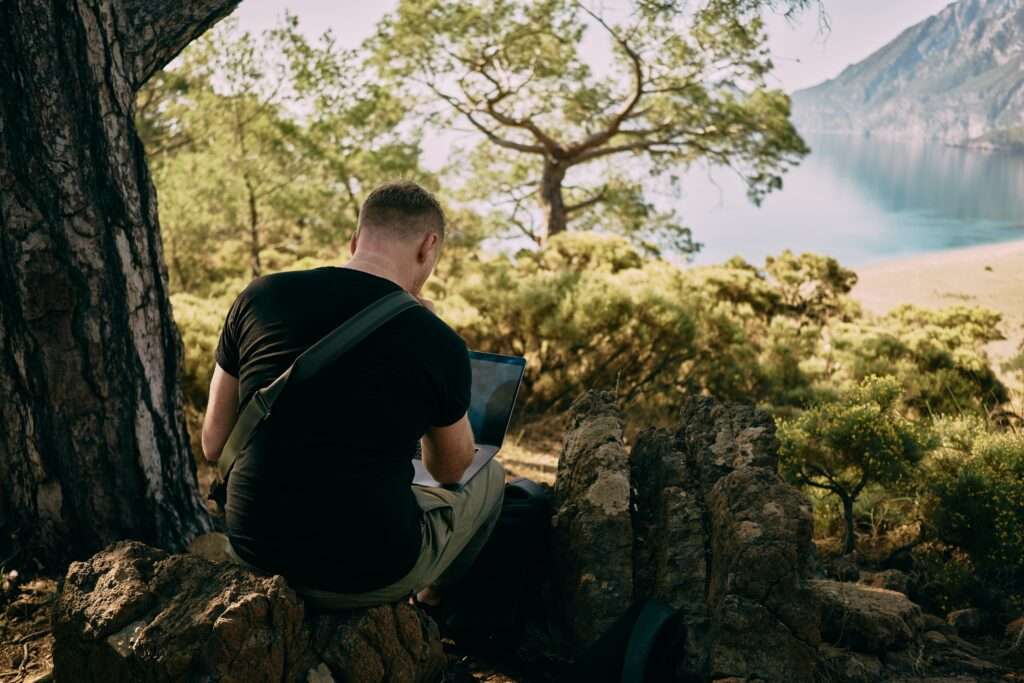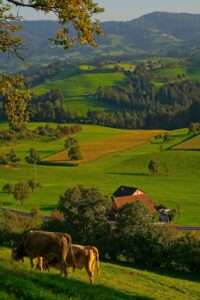By Michelle Polizzi
To travel more sustainably as a digital nomad, it’s important to first consider your goals and intentions. Remember: this is not your average vacation. Digital nomads travel for longer periods of time, typically spending weeks or even months in a particular location. If you’re not clear on why you’re engaging in this type of trip, it’ll be difficult to match your expectations with reality.
That’s why it’s important to ask yourself: what are you hoping to get out of the experience? For example, you might want to learn more about different cultures, or meet like-minded people. Understanding why you want to travel in this way is essential for guiding decisions about where you go, and why. Next, consider what kind of impact you want to have on the places you travel. Do you want to volunteer? Do you wish to support local businesses or artisans? If you haven’t thought about this question, take some time to do so.
Once you’ve thought about your goals as a digital nomad, you can make travel choices that align with those goals.
Traveling by air is always going to be detrimental to the environment, so the best way to make your trip more sustainable, despite this, is to give back to the economies you’ll visit. Your money can go a long way in another country, so it’s important that you’re funding the right interests. In fact, the choices you make around where you stay, eat, and work can have considerable impact on local people, even after you’ve left.
Lodging
Spending a week at a locally-owned guest house can bolster the quality of life in the town you’re visiting, whereas staying in a US-based hotel chain can make it harder for the local economy to stay afloat. This is true for any type of travel, but it’s especially important as a digital nomad, because you’ll likely be spending more time (and more money) in a particular region. You might also search for lodging using sites designed specifically to foster sustainable travel, such as EcoBnb or Kind Traveler.
Work Trades
Work trades are a great way to support local economies as you travel. Websites like Workaway are specifically designed to connect travelers and hosts interested in a cultural exchange.
Typically, a work trade will pay for your room and board in exchange for a few hours of volunteering. Many travelers choose to work at touristic centers, like a hostel or a retreat, because they’re great places to connect with other travelers and engage with multicultural communities. You can also work at a farm, or stay with a family through WOOF (Worldwide Opportunities on Organic Farms). Sometimes, you can contribute skills you already have (such as writing, design, coding, teaching yoga, cooking, or photography), or you might learn new skills, like farming or hospitality. Keep in mind that these places might not have a strong internet connection, so you can ask about this before you go. Or, think about going here between work stints or projects.
In addition to making your trip more sustainable, a work-trade allows you to learn new skills, meet new people, and have unique experiences that you never would’ve had on a typical vacation.
Restaurants & Coffee Shops
Similar to lodging, opting for a local restaurant instead of a chain can have a positive impact on local residents.
However, in certain places, you have to look a little harder to make sure that the restaurant is owned by an actual local, rather than an English-speaking expat. This is especially true in places like Bali, for example, where an increasing number of restaurants are Australian-owned, meaning that money is actually diverted from the local economy, rather than going back into it. Browsing Google reviews beforehand, or stopping by to check out the menu and vibe, can help you make that call. Since you’ll be working, you have to think about more than just where to stay and what to eat. You also have to think about where you’ll work—and whether there will be a strong Wi-Fi connection, should you need it. Coffee shops are a go-to for digital nomads, so follow the same method for restaurants—you might even look up keywords like “wi-fi” or “work” to see if previous nomads have left some information to guide you. If possible, try to visit a coffee shop that grows coffee in that country, as this further supports local economies and can foster a positive impact on farmers and their workers.
For more visit https://www.sustainably-chic.com/blog/the-digital-nomads-guide-to-sustainable-travel



